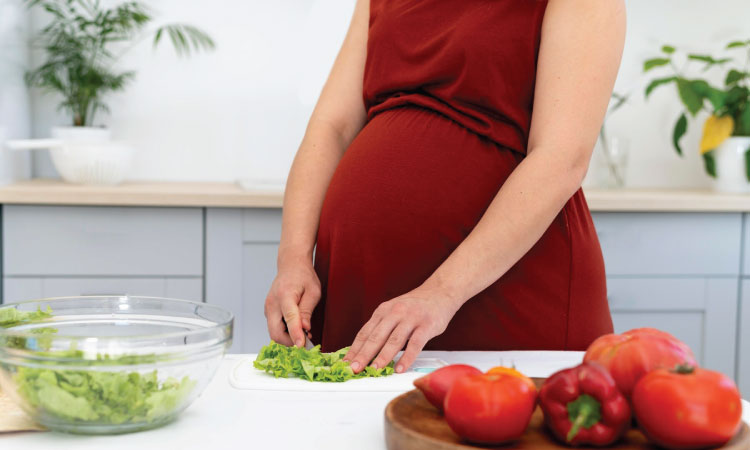In the third trimester, many women’s appetites begin to wane due to the fact that their bellies simply cannot accommodate the growing baby. Pregnant women must eat healthily during this time because the fetus is growing rapidly in the last few months of pregnancy.
In fact, the fetus gains approximately fifty percent of its total body weight during this period. Let us have a better understanding of the loss of appetite during pregnancy (3rd trimester) and tips to combat it.
What Causes Loss Of Appetite During Pregnancy—3rd Trimester?
There are several potential causes for the lack of appetite in the third trimester. First and foremost, many of the symptoms that contribute to a loss of appetite in the first trimester, which resolve in the second trimester, begin to return in the third trimester.
Related Reading: Loss Of Appetite During Pregnancy- 2nd Trimester- Reasons And Tips To Cope
Here are some of the main reasons why women lose their appetite in the third trimester of pregnancy:
1. Growing Uterus
Dr Ankita Patel Tayal , our panel gynaecologist explains that the expansion of your uterus during this stage of pregnancy is likely the culprit behind the decreased appetite. Due to the uterus’s increased size, there is very little room left for the adjacent organs to function properly.
The uterus exerts extra pressure on organs like the stomach and small intestine. This prevents them from functioning normally. There isn’t enough space for food, simply put.
The brain receives the signal that the stomach is full before the stomach is actually full, and it suppresses the feeling of hunger as a result, leading to a loss of appetite.
Calculate Due Date With LMP
2. Heartburn
When you are pregnant, the increased amount of acid in your stomach can cause a variety of uncomfortable side effects. Food is broken down and digested by stomach acid. However, excessive stomach acid can cause rapid satiety.
The fetus is growing rapidly in the third trimester. So, the uterus grows in size. The expanding uterus can squeeze the stomach and force stomach acids into the esophagus.
Therefore, heartburn is more prevalent in the third trimester. One of the less well-known side effects of heartburn is that it can cause a decrease in appetite. It also gives pregnant women a sense of aversion to spicy or citrus-filled foods.
Related Reading: 7 Ways To Manage Loss Of Appetite During Early Pregnancy
Additionally, heartburn causes women who are pregnant to develop an aversion to foods that are particularly spicy or citrus-heavy.
3. Constipation
Constipation is another common pregnancy symptom that can contribute to loss of appetite in the third trimester. Understandably, someone experiencing constipation would avoid eating out of fear that it would worsen their condition.
Pregnant women’s appetites are also stifled by constipation because they feel full and bloated due to food remaining in their systems for longer periods of time.
A lack of space in your stomach means that your body won’t send you hunger signals. That means you will just not feel like eating anything. Depending on how bad your constipation is, you might also lose your appetite and start skipping meals.
4. Bloating

It is common for bloating to develop during the first trimester, and it may worsen during the third. The hormone progesterone is responsible for pregnancy-related bloating. In preparation for the impending labor, the level of progesterone begins to rise during the third trimester of pregnancy.
Progesterone relaxes the muscles in your body. The hormone progesterone has a muscle-relaxing effect on the body. Intestine muscles are included in this.
When intestinal muscles move more slowly, digestion slows down. This allows gas to accumulate, resulting in abdominal bloating. It induces a feeling of satiety and thereby contributes to appetite loss.
5. Mental Health
We have discussed the physical causes of appetite loss during pregnancy. Next, we need to consider the possibility that changes in your mental health may be to blame for the loss of appetite in the third trimester of pregnancy.
Anxiety and depression have been linked to changes in appetite1. Pregnancy can bring on a slew of new feelings, including fear and excitement. Anxiety about labor, the baby, or upcoming life changes is common among pregnant women as they enter the third trimester.
Related Reading: 15 Tried And Tested Ways To Handle Emotions During Pregnancy
Furthermore, prenatal depression is prevalent in the third trimester2. All these factors can contribute to loss of appetite in the third trimester.
6. Problems With Body Image
It’s not uncommon for pregnant women to avoid food because they worry about their body image. A majority of pregnant women will go through at least some degree of weight gain and loss of shape during their pregnancies.
Nevertheless, coming to terms with this reality may be difficult for some women who are pregnant.
Pregnancy has the potential to either initiate or exacerbate body image issues and eating disorders for women who have a history of struggling with these mental health issues. They may cut back on food, either on purpose or unintentionally, to avoid gaining weight.
Tips for Combating Loss of Appetite During The Third Trimester

It is imperative that you put on a healthy amount of weight during the third trimester of pregnancy, regardless of whether or not you are experiencing a loss of appetite during this time.
According to Dr Ankita Patel Tayal, MD obgyn, the key nutrients to include at this stage are vitamin D, iron, long-chain polyunsaturated fatty acids (LCPs), and DHA.
In order to support the developing bones, eyes, and cognitive function of the unborn baby and to reduce tiredness and fatigue, these nutrients are essential.
Here are some suggestions for combating appetite loss during the third trimester:
1. Eat small meals
Because of the increasing pressure on their stomachs, pregnant women will find that they are unable to consume very much food during their third trimester.
Eating more frequently and in smaller portions helps pregnant women get the nutrients they need while also easing the strain on their digestive system.
Another way to ensure that both mother and unborn child receive a steady supply of nutrients and energy is to eat healthy snacks throughout the day.
Related Reading: 8 Tips To Cope With Anxiety During Pregnancy Third Trimester
2. Eat fiber-rich foods
It’s also a good idea to stock up on high-fiber foods such as whole wheat bread, avocados, and leafy greens. Reduce the feeling of constipation by improving your digestion with this method.
3. Take measures to prevent constipation.
If you suspect that constipation is affecting your appetite, take steps to restore normal bowel function. The risk of constipation can be reduced by drinking more water, increasing fiber intake, using a poop stool, and taking an iron supplement that will not cause constipation.
4. Stay physically active
Regular physical activity may help increase your appetite. Before embarking on an exercise regimen during pregnancy, consult with your doctor.
Related Reading: 9 Problems Lack Of Exercise During Pregnancy Can Cause
Taking a 20-minute stroll before a meal will help you eat better. On the contrary, it has been found that strenuous exercise suppresses appetite3.
5. Try standing up when you eat
Many pregnant women find it more comfortable to eat standing up rather than sitting, as it reduces the pressure on their expanding stomachs. Likewise, never put additional pressure on your stomach after eating as well.
A 10-minute stroll (slowly) after a meal is a good practice. Placing a pillow beneath your head and shoulders while lying down prevents stomach acid from rising during sleep.
6. Take note of when your appetite is at its best
There will be a window for appetite as well. Occasionally, your appetite will return for a brief period of time. For some, this occurs in the morning, and their appetite decreases as the day progresses. Others may feel the exact opposite way.
Make use of this appetite window. Consume as much nutritious food as possible at this time. Don’t stop yourself from eating when you’re hungry.
7. Home remedies
You can try some home remedies to re-establish your appetite. Ginger tea, fennel tea, ajwain water, and Indian gooseberry juice are highly effective appetite stimulants.
Related Reading: 10 Teas That Are Best Avoided During Pregnancy
9. Take care of the emotional health
Emotions and hunger are often intertwined. It’s not uncommon for expectant mothers to feel completely overwhelmed by the demands of their growing baby.
Women are more likely to suffer from unnecessary stress, anxiety, and mental health issues as a result of this.
If you suspect you’re not eating because of anxiety or depression, reach out for help. If you suspect that your lack of appetite is due to anxiety or depression, seek assistance.
Related Reading: A Rundown On What Husbands Should Not Do During Pregnancy
9. Yoga
Many yoga asanas, such as the Cat and Cow stretch, aid in regaining one’s appetite4. Consult a yoga instructor who specializes in prenatal asanas to learn which poses are safe to perform.
The third trimester of pregnancy is when expectant mothers experience the most significant physical and emotional shifts.
Even though a loss of appetite for a short period of time is usually not harmful, if it continues for an extended period of time, it could be harmful to the mother’s health as well as the unborn baby’s.
It is therefore important to know the reasons why pregnant women lose appetite and how to deal with those issues so you can stay nutritionally healthy.


